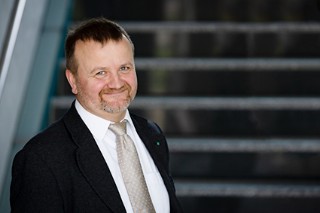Our research in polymer engineering focuses on the manufacturing and recycling of plastic components, from synthesis and processing through to component manufacture. Our research is accompanied by an evaluation of the raw material base and raw material efficiency, simulation of environmental impacts in the use phase, and product recycling including life cycle analysis (LCA).
Polymer synthesis forms the basis for our further development of classic polymers such as polyurethanes, polyesters and polyamides, with the aim of improving their functionalities, performance and application range. Our developments aim for sustainability, for example plastics based on bio-based raw materials or the full recycling of used plastics. The same applies to additive synthesis with halogen-free flame retardants, sustainable plasticizer systems or compatibilizers for new plastic compounds. Our polymer developments, for example, aim to combine thermoplastic and thermoset functionalities for application in highly resilient bonds.
The research group for material development and compounding technologies specializes in the development of new compounding processes and material formulations. Particularly important topics include extractive compounding processes to reduce emissions, the removal of impurities to facilitate recycling, and innovative reactive extrusion for polymer synthesis or polymer modification in twin-screw extruders.
Key tasks in the field of foam technologies are the development and use of particle foam technology and the manufacture of foamed semi-finished products in the direct foam process. Besides the optimization of conventional materials we are concerned with the foaming of biobased and technical polymers that are more resistant to increased temperatures. New sintering technologies, such as radio frequency technology, are opening up completely new areas of application.
In the field of additive manufacturing, we are researching the development of customized material formulations, for example by incorporating reinforcing fibers and functional additives into the polymer. On the process side, we are exploring the improvement of the mechanical properties of additively manufactured components by directly integrating continuous fibers oriented along the load paths.
The research group for injection and compression molding focuses on standard and specialized processes for (fiber composite) materials. The integration of local, load-path-compatible wound or tape-laid fiber composite structures into injection molded components significantly improves the mechanical properties.
The industrialization of process chains for the production of highly resilient, continuous-fiber-reinforced lightweight structures is our main research topic in the area of structural composites. The core technologies involved are resin transfer molding, wet compression molding, thermoplastic tape laying and pultrusion. The placement of textile and pre-impregnated semi-finished products to produce preforms, and their handling, combination with polymer foams and metallic structures and subsequent resin infusion or shaping, are important steps within the processing chains.
In the field of microwave and plasma technology we develop customized equipment, measurement technology and methods for thermal processing and coating. Applications include microwave-based heating of polymers, accelerated curing of adhesives and resin systems, microwave-assisted chemical reaction technology and the coating or modification of surfaces in the plasma-enhanced chemical vapor deposition process. A particular focus is on corrosion-resistant layers and nanoporous adhesive layers.
Our research group for material characterization and failure analysis carries out comprehensive investigations into polymer materials along the entire processing chain, from the raw material through to the component. In the event of damage or failure, we offer systematic analysis of the causes, the material failure and the influences that led to it, using analytical and technological measurement methods.
In the field of online process monitoring we develop spectral and microwave-based measurement methods for plant-integrated process and material monitoring, and for process control. Our projects in the context of Industry 4.0 are based on the process integration of sensors. This also includes processspecific know-how in raw data evaluation. The application and integration of big data and AI algorithms enable learning or immature processes to be investigated.
In the area of recycling and waste management we develop processes and technologies for the material recycling of polymers, aiming for their complete reintroduction into high-quality applications. In the case of thermoset polymer systems this involves chemical, solvolytic cleavage into components that can be very specifically repolymerized to form this type of material. As an example, aircraft seats containing polyurethane foam were processed, the separated polyurethane was depolymerized and, after purification of the resulting decomposition products, a targeted synthesis of new seat foams with intrinsic flame retardancy was carried out. An accompanying life-cycle assessment (LCA) quantified the sustainability of these systems according to various impact categories. Further recycling applications can be found in the area of PET and PLA recycling at Fraunhofer ICT. Both classes of polyester can be depolymerized to their monomers via chemical and catalytic processes, purified and then recycled back to the original polymers. These processes were also evaluated in terms of their sustainability via a life-cycle analysis. Recent work relates to process development for the recycling of silicone materials.
In the synthesis of sustainable polymers, bio-based systems have always played an important role at Fraunhofer ICT, for example thermosetting, lignin-based epoxies for surface finishes or odor barrier layers to prevent evaporation.
 Fraunhofer Institute for Chemical Technology ICT
Fraunhofer Institute for Chemical Technology ICT

